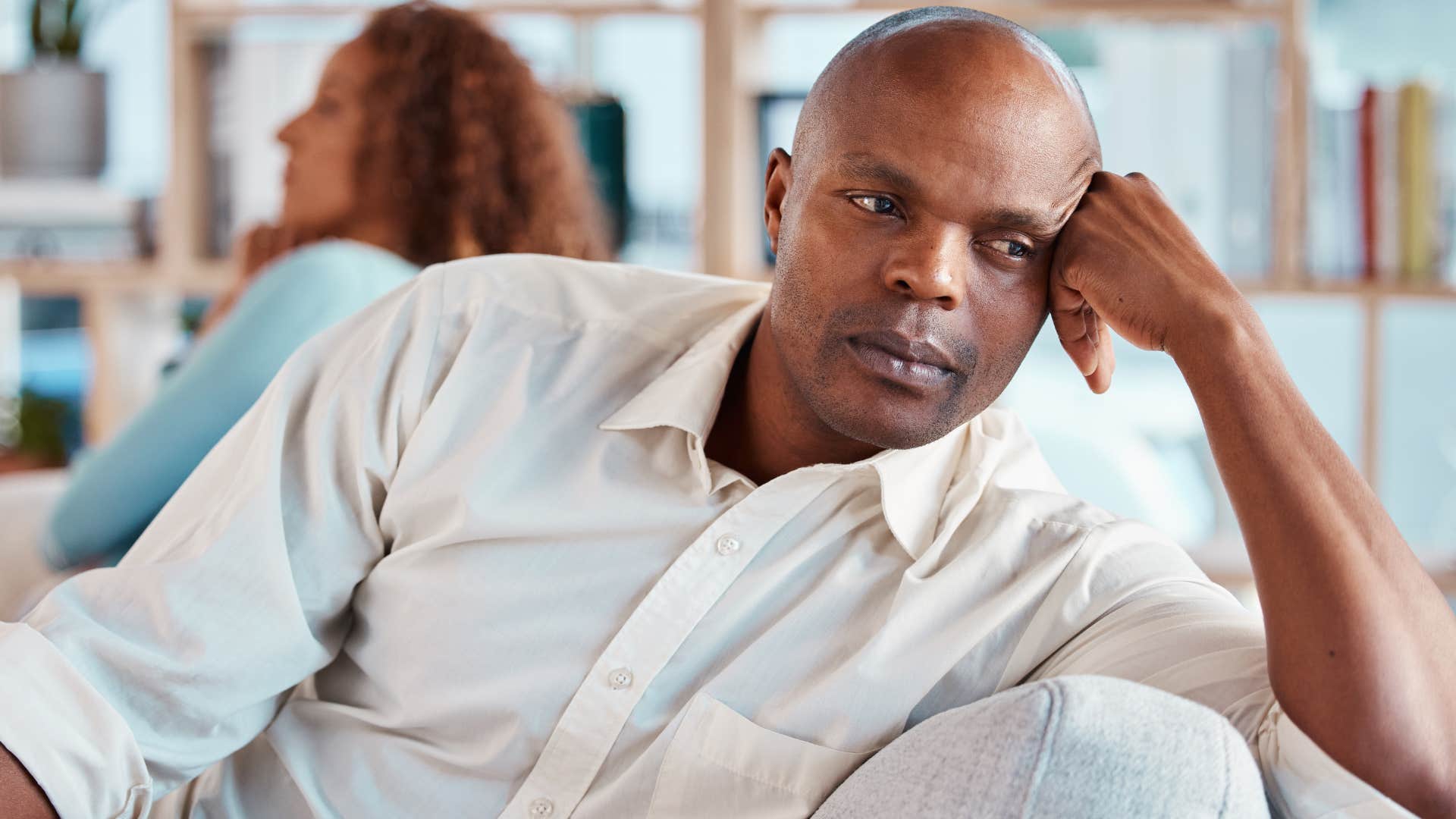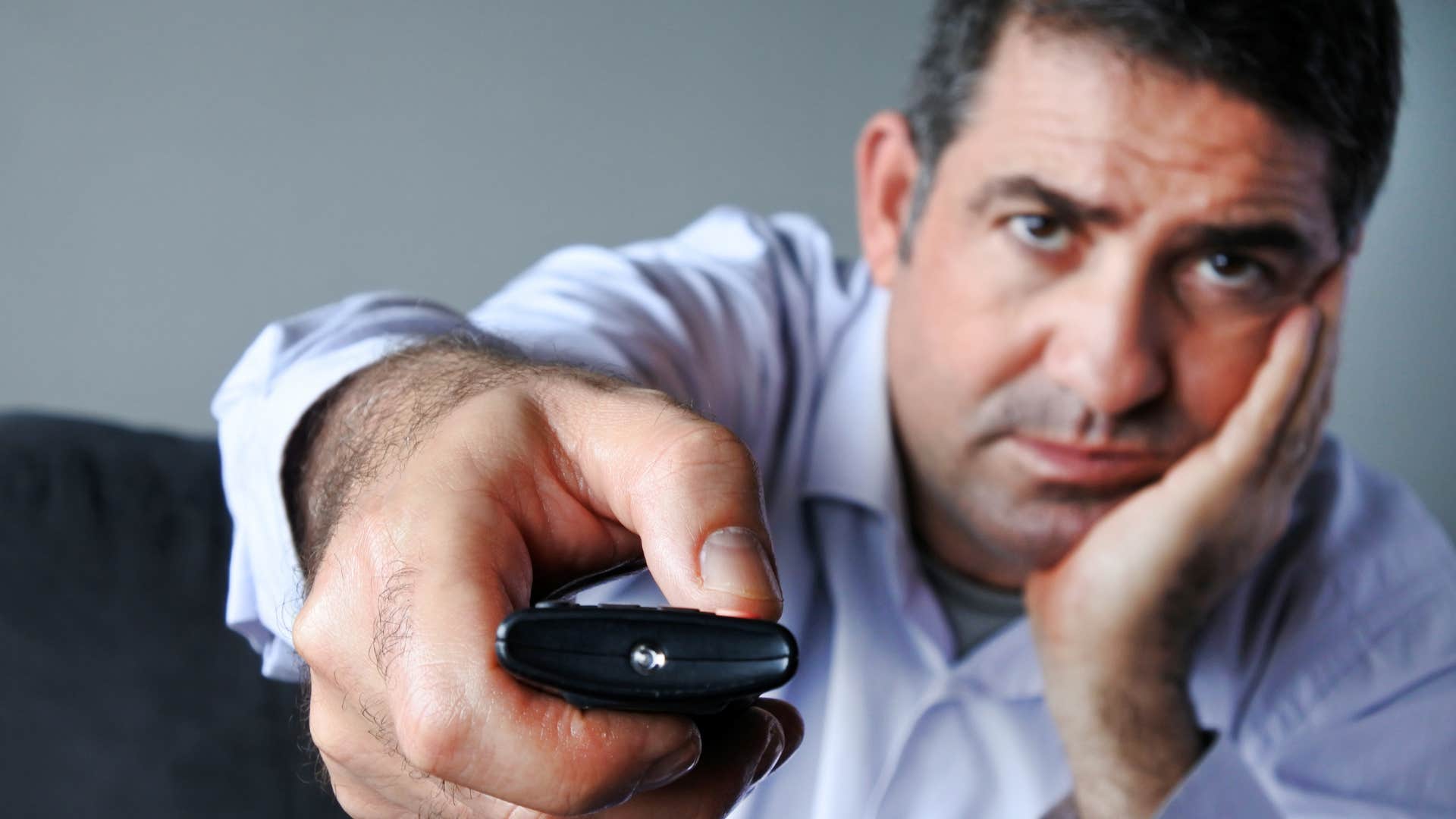Wives Who’ve Stopped Feeling Desired Almost Always Notice These 11 Tiny Changes In Their Husbands
Relationships are just as much about attraction as they are about effort.
 LightField Studios / Shutterstock
LightField Studios / Shutterstock Attraction is fundamental to relationship satisfaction, not only for the sake of drawing a couple toward each other, but also in regard to enhancing feelings of love, appreciation, and commitment. While over-the-top compliments and praise aren't necessary all the time, doing little things like checking in throughout the day or making quality time together a priority can make partners feel desired and attractive.
However, wives who’ve stopped feeling desired almost always notice tiny changes in their husbands that leave them feeling hurt and confused. Their husbands may compliment them every once in a while, but they don't put in the kind of effort or attention that strengthens a couple's bond over time.
Wives who’ve stopped feeling desired almost always notice these 11 tiny changes in their husbands
1. He stops paying attention
 MDV Edwards | Shutterstock.com
MDV Edwards | Shutterstock.com
According to a study published in Social Neuroscience, when we perceive someone to be actively listening and paying attention to us when we’re speaking, it creates stronger bonds and intention in our conversations. We feel valued and loved when someone pays attention, especially in romantic relationships and marriages, often characterized by the health of small conversations and interactions throughout the day.
However, when wives don’t feel desired by their husbands, it’s these small changes that they notice first. They could be talking for minutes before their partner looks up from their phone, or trying to beg for attention when expressing their own emotions. Regardless, they always leave conversations feeling less happy and fulfilled.
2. He pulls away from physical affection
 Lightfield Studios | Shutterstock.com
Lightfield Studios | Shutterstock.com
Generally speaking, couples who indulge in more physical affection, from holding hands in public to cuddling before bed, typically experience better relationship satisfaction than those who don’t make time for it, according to a study published in Scientific Reports.
It’s a driver of relationship bonds, making people feel special, valued, and loved, even when they’re not actively speaking to their partners. However, when a husband stops leaning into this physical affection or sparking it himself, it’s not surprising that his wife will feel less desired and appreciated.
3. He becomes angrier and more defensive
 PeopleImages | Shutterstock.com
PeopleImages | Shutterstock.com
When women notice a shift in their husbands toward a more angry and defensive foundation, it’s not just their arguments that take a toll, but every interaction. These women no longer feel safe to express their concerns or bring up opinions without immediately feeling like they’re taking the blame for their husbands’ discomfort.
While it’s true that some men might grow more defensive or angry with age, experts from Harvard Health argue that it’s not just their relationships that take a toll, but also their heart health. They’re more defensive and avoidant in the face of vulnerability, but they’re also putting more strain and pressure on their mental and physical well-being.
4. He never gives compliments anymore
 Ground Picture | Shutterstock.com
Ground Picture | Shutterstock.com
While self-esteem often plays a big role in predicting compliments in a relationship, including how well they’re received, according to a study published in the Journal of Personality and Social Psychology, it’s actually connection and desirability that shift in a relationship when they’re overlooked. Whether a wife is self-assured or not, noticing a shift in her husband’s effort with compliments can feel disorienting and isolating.
From passing compliments to noticing when she’s changed something about her appearance, sometimes it’s these small moments that actually mean the most.
5. He’s always on his phone
 Prostock-studio | Shutterstock.com
Prostock-studio | Shutterstock.com
Couples who spend more time scrolling on their phones often have more unfulfilling and unhappy relationships than those who spend less time online. Not only can tons of time on a phone be disruptive to conversations and quality time, but it can also make one partner feel consistently undesired and unappreciated.
If a wife notices her husband is always on his phone and spending more time scrolling than paying attention to her, she’ll inevitably feel disconnected, frustrated, and anxious.
6. He makes hurtful jokes
 Face Stock | Shutterstock.com
Face Stock | Shutterstock.com
Even if they’re rooted in sarcastic or petty jokes, making hurtful comments at the expense of a partner to cope with personal discomfort or to make other people laugh will always sabotage true health in a marriage. If you’re trying to gain external validation, but hurting your partner to do it, your priorities are all wrong.
If you consistently feel worse after hanging out with or talking to your partner, that’s a red flag in itself.
7. He rarely checks in
 Lightfield Studios | Shutterstock.com
Lightfield Studios | Shutterstock.com
Whether it’s in person or a quick text during the day, wives who’ve stopped feeling desired almost always notice when their husbands stop checking in. Even the smallest and seemingly insignificant text messages throughout the day can remind a partner that they’re valued, especially if they’re having a rough day.
However, missing out on those small moments of connection can be detrimental. Of course, real conversations and moments of connection influence a couple’s bond and partner’s individual health, but the absence of these moments can prompt even more disconnection.
8. He’s more impatient
 Dean Drobot | Shutterstock.com
Dean Drobot | Shutterstock.com
According to a study published in the Journal of Research in Personality, impulsivity in partners often lowers relationship satisfaction, so if a husband is acting more impatient or making decisions on his own accord, it’s no surprise that their wives feel less heard and appreciated.
From big things like financial impulsivity to smaller snaps in everyday arguments, wives who’ve stopped feeling desired by their husbands may miss out on small, safe moments to express their concerns, feelings, and emotions.
9. He stops asking questions
 AlpakaVideo | Shutterstock.com
AlpakaVideo | Shutterstock.com
The quality of our relationships is often reliant on the health of our conversations, including how well we listen, engage with, and speak to other people in our lives. Part of healthy conversations is knowing when to ask questions and being intentional about crafting thoughtful prompts into another person’s life.
When a husband stops putting in the effort of asking questions and genuinely listening to his wife’s responses, it’s not just passive, casual conversations that suffer, but larger conflicts and arguments centered around a couple’s ability to come together verbally.
10. He’s always distracted
 Inside Creative House | Shutterstock.com
Inside Creative House | Shutterstock.com
Whether it’s the presence of a cell phone, an overwhelming workload, or a general avoidance of connection at home, wives who’ve stopped feeling desired almost always notice this emotional and literal distance from their husbands. It might feel like a tiny change at first, not spending a ton of quality time together or getting their full attention during conversations, but in the end, it’s actually a sign of something much bigger.
The loss of romantic love that tends to end relationships is rooted in the loss of trust, intimacy, and connection. If a wife doesn’t feel loved, that’s a dead giveaway that she’s likely not getting the attention, commitment, or energy she needs to form a healthy relationship.
11. He chooses anything else over intimacy
 ChameleonsEye | Shutterstock.com
ChameleonsEye | Shutterstock.com
Whether it’s watching TV late at night, spending more time at work, or prioritizing friendships over quality time at home, wives who’ve stopped feeling desired almost always notice these tiny changes in their husbands.
They crave togetherness and connection, but when they ask for it, he always has some kind of excuse for avoiding it altogether. At a certain point, they can only hear “I’m not in the mood” or “I’m too busy today” to justify their absence so many times.
Zayda Slabbekoorn is a senior editorial strategist with a bachelor’s degree in social relations & policy and gender studies who focuses on psychology, relationships, self-help, and human interest stories.

